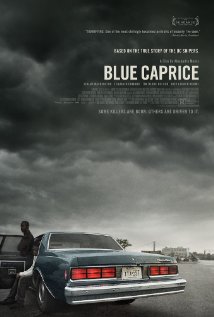
BLUE CAPRICE
US, 2013, 96 minutes, Colour.
Isaiah Washington, Tequan Richmond, Tim Blake Nelson, Joey Lauren Adams.
Directed by Alexandre Moors.
A blue Caprice was the car that the two protagonists of this film by so that they could go on this killing spree across the United States, killing indiscriminately, a whole range of people in American society. The killings were known as the Beltway killings.
The film opens in Antigua, focusing on a mother leaving her 18-year-old son, Lee, a silent boy, who becomes interested in a visiting African- American man, John, who is playing with his children. John adopts Lee and becomes his father figure. When they go to the United States, John resumes his old life, meet his friend Ray, Tim Blake Nelson, an expert in firearms who trains Lee who, in fact, is an accurate shot.
The film is quite frightening in its psychological portrait of an older man grooming a younger so that he would become a killer, sharing in the older man’s ambitions to kill at random, his anger against society. As, the audience watches, perhaps sometimes bewildered, at the young man’s assimilation of the values, even studying manuals on being a sniper.
Tequan Richmond is effective as the young man, silent, in need of affirmation and affection, finding it in the stranger, played by Isaiah Washington, who is one of the film’s producers, giving himself the sinister role.
Some audiences find it difficult when films dramatise real-life tragedies as this one does. However, it does not dwell on the killings, but rather on the psychological relationship between the two.
1. A true story, a small, independent film?
2. The value of dramatising this kind of true story, the touch of the sensational, this film being comparatively reticent in its portrayal of the serial killings, focusing on the assailants, their methods, their motives?
3. The portrait of the two men, the influence of one on the other?
4. The opening in Antigua, the Caribbean, Lee, his age, his mother, her leaving? His being taciturn? Alone, wandering? The beach?
5. The encounter with John, the children, the invitation to join them, John rescuing Lee from the water? The meal? His feelings, the sense of belonging with John, listening to his stories, his children and the custody issues?
6. Going to America? To Washington State?
7. John, good with his children, a father figure to Lee? The story, his children, anger about their abduction, the law and his rights? The girlfriend, telling her the story? The law and decisions? Taking Lee around the town, showing the house of the woman who testified against him – and her later being the victim of Lee and his impersonal shooting?
8. John and his friendship with Ray, the past, the importance of guns, the shooting practice, Lee and his interest, the range of guns, his accuracy?
9. Jamie, the baby, Ray, with John, with Lee?
10. The gradual grooming of Lee by John, sharing the violence, the hostile attitudes, the amoral attitude towards killing? The gradual incitement to killing? The reasons given, Lee and his reading, going to shoot the woman at her door? His realisation that he had made a mistake? The effect of killings on him?
11. The reading the book on snipers? His growing expertise through his reading, reflection, discussions?
12. The buying of the car, changing it so that there would be the sniper’s hole in the back of the car? The ride around the town with the man to get guns, his refusal? Ray and his examining the car and realising what it was for?
13. Going across America, the choosing of victims, arbitrary except for having someone to represent every aspect of American society, young and old, men and women, children and adults, races? John and his seeming indifference except for the fact that he was fulfilling some kind of fate in killing people? The effect on Lee, his choosing the victims, the angles, shooting them?
14. The glimpses of the victims, their deaths, their being set up, people moving out of focus and their lives being saved?
15. No scene of the arrest? Lee, the interrogation, his explanation of himself after his silence, the reasons for killing, the lack of reasons? His main question about where John was, where was his father?
16. The impact on the audience, the deaths, serial killers in the United States, the availability of weapons? The mentality? The intense portrait of a man grooming a younger man to fulfil his ambitions and violent desires?